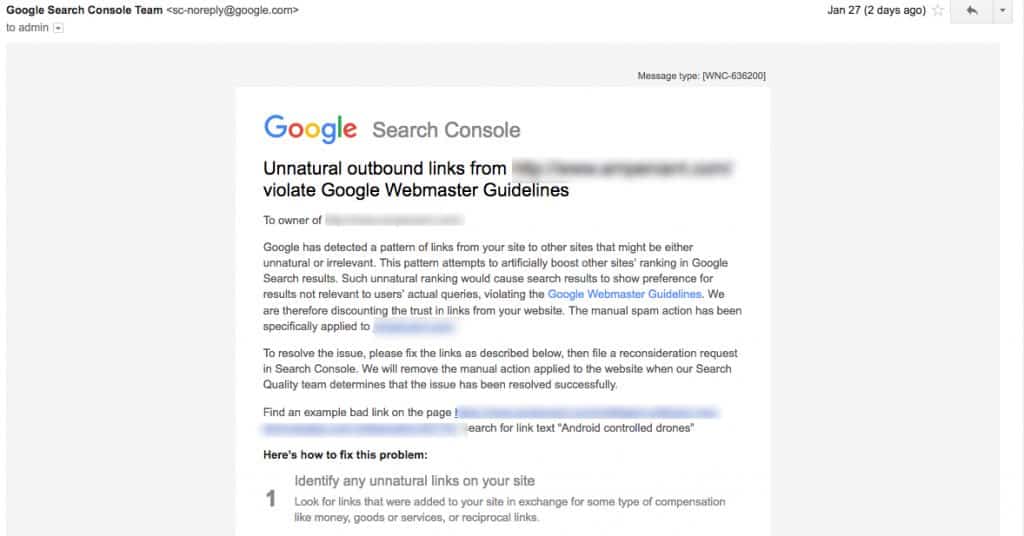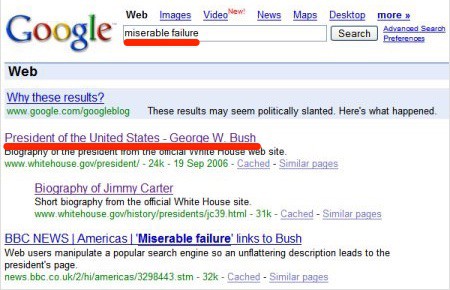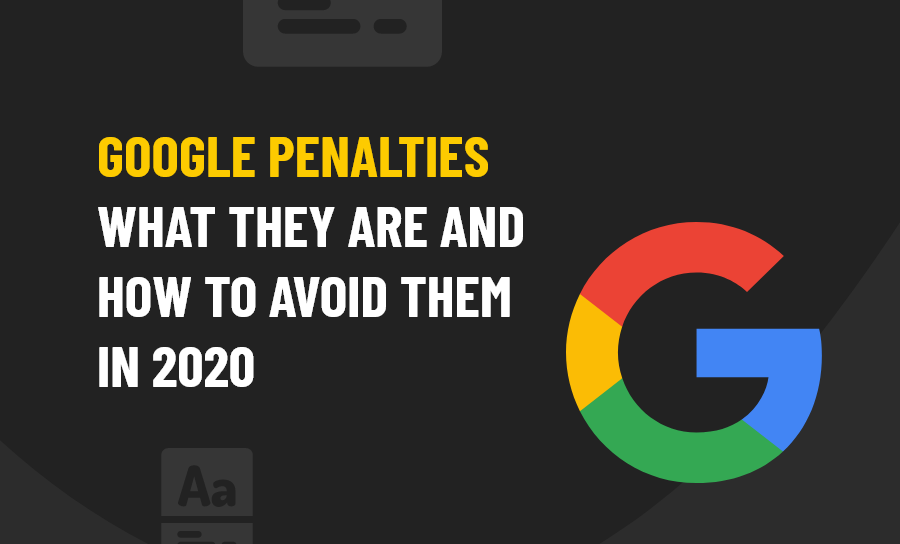Google Penalties are scary. Make a mistake the search bots – and Google’s ever-changing – and sometimes very fickle – algorithm deems unsuitable and all the hard work you’ve put into creating your website and then trying to make use of search engine optimization to get the site noticed, could be for naught, as a Google Penalty can render it near invisible in an instant.
Google penalties are not fun, whatever they are assessed for (more on that later). And recovering from them can be a long, hard (and very occasionally even impossible) process. We know, we spend much of our time trying to help clients whose sites have fallen afoul of the Google bots get back into their good graces.
Here we are going to look at what you, as a website owner, content creator and a business stakeholder can do to avoid Google Penalties in the first place.
Types of Google Penalty
Before getting into the ‘subsections’ of penalties, it helps to understand that there are two basic types of penalty. The manual Google Penalty and the algorithmic Google Penalty.
A manual penalty is an issue when an actual human being from the Big G has reviewed your site, found something offensive to Google and issued a penalty ‘by hand’. These types of penalties Google will inform you about, via a message in Google Console (just one of the may reasons staying on top of things there is so important.)
In this message, you will be told why your site has been penalized, and you will receive suggestions on how to fix things and a link to resubmit your site for reconsideration when you have implemented those suggestions.

As scary as they sound, manual penalties are, in some ways, the ‘better’ choice when it comes to being penalized by Google. You know right away what they don’t like, for the most part, what they want you to do to fix it and a clearly defined path back to the positive side of the SERPs.
Algorithmic penalties, on the other hand, are the devil. Google won’t tell you when they’ve issued one. Or why. Or how to fix the problem. That’s mainly because humans don’t issue these, bots so. And search bots are generally very bad at communicating the reasons why they are taking the actions they are with the likes of mere site owners.
In this piece, we’ll be looking at some of the most common reasons that algorithmic penalties were issued in 2023. The one other thing that it is very important to understand is that Google’s algorithm’s change all the time. Literally.
According to Moz, an authority on all things SEO, Google now updates its ‘algos’ 500-600 times a year. Some of the changes are big; some are much smaller. Sometimes they warn people (vaguely)that something’s changing, sometimes they don’t (actually, most of the time they don’t) And they don’t offer a lot of guidance on how to fix things if you get slapped.
However, Google does offer plenty of advice – and even free resources – on how to avoid an algorithmic penalty in general. Again, it’s often maddening vague but those of us with the time and patience to analyse what they say (and just listen in general) can usually figure out very quickly what’s going on.
So, in 2023, what are some of the most common ‘sins’ that can sink your site in the SERPs? While there are many of them, here’s a breakdown of some of the most common and what you should be doing to stay on Google’s nice list and off its dreaded naughty list.
Not Understanding the Rules
Remember we said Google were not always very clear about what they expected to see in (on) a website they love and will place at the top of the SERPs? That wasn’t quite true. They are not very clear on Twitter, or Reddit, when asked – although following the likes of Danny Sullivan can be VERY helpful – but they are very clear in a document called the Google Webmaster Guidelines.
We say document; we mean tome. It’s a big, constantly updated set of rules that sadly, most website owners – and even more than a few ‘SEOs’ – don’t bother to read, which costs them all dearly.
It’s not an exciting read. Or a short one. It is updated a lot which means reading it again. It’s a PIA. But as a website owner, you should bite the bullet and do it. Or hire someone who will (like the Pearl Lemon SEO team.)
Skipping Content Audits
As they grow their website, most people ensure that it is full of content. Smart ones ensure that it is full of content that updates regularly, as that’s the only reliable way to keep search bots coming back to reconsider your place in the SERPs. Even smarter ones do a content audit at least once every six months.
The term content audit sounds very stuffy and boring. And executing one is, and can be more time consuming than you’d like. But it’s still a must.
What does a content audit involve (or should it involve?) After ensuring you are familiar with the contents of the Google Webmaster Guidelines, you need to go through every page on your site and make sure that as far as possible, each one of them meets those guidelines.
Some of the biggest things to ensure are that all the content on your site is well-written, is not keyword-stuffed and serves a purpose. Google is not at all fond of content for content’s sake, or, as more often the case, a misguided effort to cram a few extra keywords and key phrases in. And it likes to see stuff that’s original, engaging and offers value.
There are technical considerations too, more of them than people realise. Google wants to ‘see’ images that are optimized for size and speed and displayed in a format that’s friendly for both mobile and desktop users. They want to see alt tags attached to those images, especially as that is the only way their bots can see what they are.
If your website has more than, let’s say, five pages (which most do) this isn’t a short manual process. Making use of Google Analytics can help though, as it can identify a lot of issues for you, saving you the time and hassle of combing through every single page on your site by hand.
Failure to Clean Up Your Link Profile
Backlinks have always been at the heart of SEO and SERPs success, but the way they are obtained – and indeed the very links themselves – has changed a lot over the years, especially when it comes to the links Google considers beneficial to a website and those that it considers harmful, spammy, fraudulent and will penalise you for (usually without notification of any kind)
Good backlinking processes – and how to find and obtain good backlinks – is a massive subject on its own and an area of SEO that takes time and effort to master. But even before you take all that on its crucial, you know just who is currently linking to your site and whether or not the links you do have are helping or harming your chances of ranking well in the SERPs.
As we mentioned, good link building practices have changed a lot. Years ago, it was not considered terrible to obtain links in slightly devious ways – buying links has ALWAYS been against Google Webmaster Guidelines though, since day one – and people did so. They would exploit things like the comment sections in blog posts to leave a ‘stealth link’ or place links on high authority sites using ‘backdoor’ methods that were, even back then, questionable.
And yes, people bought links anyway, including people who are claiming that they were providing an SEO service for clients. And those links, if they are still on your site, have probably already hurt you in the SERPs and you don’t even know it.
That’s why conducting an extensive link audit is a must. The very basics you must consider for each link include:
Where did the link come from? Is the site a reputable one, or considered spammy? Links to PBNs = private blog networks – can be a real problem, as PBNs were once considered ‘OK’ by Google (many years ago) even if it is created by using best VPN, but are now penalised against and considered spam, as are any links placed on them. Lots of those sites are gone now, but many remain, and any links you placed (or someone placed for you) may be damaging your site.
One other thing that many people do not even know should be taken into consideration when conducting a link audit is the anchor text used to create the link. Once upon a time (a long time ago), exact match anchor text was fine. But then people got silly and began doing things like this, having understood that Google was relying heavily on anchor text to determine what a page was about:
George Bush quickly ranked #1 for the term “miserable failure” thanks to a successful “Google bomb.” And this is one of example of many. Things had to change.

So, in April 2012, Google rolled out the first instance of the now-infamous Penguin algorithm, and anchor text was one of its primary targets.
Some websites that had been overly-aggressive with their exact-match anchor text links saw their rankings plummet overnight. Penguin battles manipulative anchor text spam to this day. So we now recommend using exact-match anchor text as little as possible— between ~1% and 5% is more than enough.
The fact is that Google search bots are now far too smart to need anchor text to determine what a page is about, so too much exact match text and they simply refuse to carry on and mark the page as spam.
This means if you have old backlinks that made use of too much anchor text, then they may be harming your site too.
We know all this sounds complex. It is, but there are tools to help you conduct a good backlink audit. Our favorite, by far, is the Ahrefs’ Backlink Checker. It won’t do all the work for you, and only you can decide what to do with bad links you find, but it is a big help, and over the years we have found it to be the best tool of its kind.
Keep Yourself Informed
As we mentioned, Google makes changes to their algorithm all the time, and it is very rare that they announce such things. Occasionally, if a BIG update is coming, they will make a vague reference to it. So, to work things out, it’s up to a species of SEO geek that makes it their business to analyze algorithms constantly to work out what’s changing, why it’s changing and what types of things are being affected.
It takes a special kind of brain to want to do that, as it can be tedious and difficult stuff (we are fortunate to have several of these brains on our SEO team). To reap some of the benefits of this geeky work you can check the handy Moz algorithm changelog, or, better still, work with one of these uber SEO geeks, as they tend to be even better versed than a page that is after the fact reporting (rather than real-time.)
By staying up to date like this, you can act fast if an algorithm change is going to negatively target something that exists on your site and minimize any damage while maximizing any available SERPs boosts. The reason Google keeps changing things is that as the Internet develops so does what a great webpage looks like. And as Google’s stated mission is to guide its searchers to the very best ‘stuff’ then those playing by their ‘rules’ almost always benefit.
Create (More) Great Content
It has become a HUGE cliche, but it’s still also a huge truism as well; content is king. Google bots and web surfers and searchers are looking for great content. Stuff that informs, educates, entertains, intrigues or otherwise satisfies their search intent.
What is not great content is thin, promotional content written just to make use of a few more of the keywords you’re targeting. That’s boring for humans and search bots and won’t help your SEO at all.
There is nothing wrong with the sparing use of keywords, but search bots have evolved to the level that they are able to discern the intent of the content without lots of keyword prompts. So keep keyword usage to less than 2-3% and focus instead on creating something that is useful and engaging for your visitors to consume.
Consider Sacking Your SEO Team
Maybe you already have someone doing SEO for you. And don’t get us wrong, we love SEO and are all for that. But sadly, over the years we have seen website after website, business after business damaged by SEO rather than enhanced by it.
The problem is that SEO is not a set in stone thing like, say, programming. It’s a movable feast and often very much open to a certain amount of interpretation. And it moves fast.
This means that sometimes a less than stellar, less than up to date and, sometimes less than scrupulous SEO or SEO team can do great harm.
Some of the things we still see far too often that are going to do more damage than good include all the following:
Buying links, with the SEO(s), involved telling clients ‘these links are OK’. As we said before, buying links has NEVER been OK, even back when Google was brand new.
Arranging for backlinks to be placed on those content mills we discussed earlier and in spammy ‘directories’. You do need links from directories BTW, but from good ones only Those are harder to get, so a bad SEO takes the easy way out and buys up or places links in some of the many terrible ones – directories solely created for the purpose of selling links – that are still out there.
Encouraging the use of excessive amounts of exact match anchor text (usually because they don’t know how to do anything else.)
The use of terribly outdated tactics like forum bombing, hidden text, keyword stuffing and more. All things that might not have harmed a site much five to ten years ago but might sink it now.
Before you sack your SEO, though, ask some questions. Ask them what exactly they are doing on the site? How are you gaining backlinks? Where are they coming from? Show me the sites. What is the domain authority of each site from which you’ve gained backlinks? What anchor texts are they using? How did you get them? You need to understand if your SEO is sabotaging your site or helping it.
One of the things, by the way, that Pearl Lemon has done from the start, for our very first clients, is be 110% transparent. We send reports on everything (sometimes so many clients have begged us to stop) We want you to know everything we are doing, what’s working, what’s not and what we’re doing about it. And to be honest, we don’t understand any SEO who does not do the same (unless they are doing something wrong.)
Final Word
Google Penalties are scary. They can be fixed (which is a new topic for another day) most of the time, but that takes lots of time, money and effort. So if you can make use of the information we’ve provided here and avoid them, it can only be a good thing.
And by the way, if you’re in the market for a new SEO – maybe you’re going to sack your old one – contact us, we’ll be happy to help.









